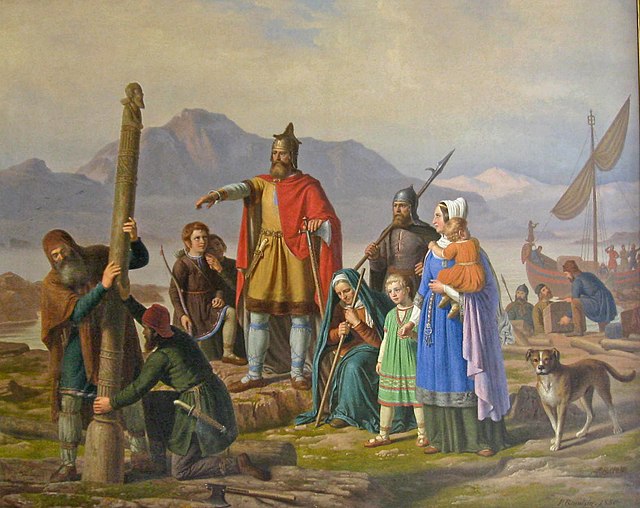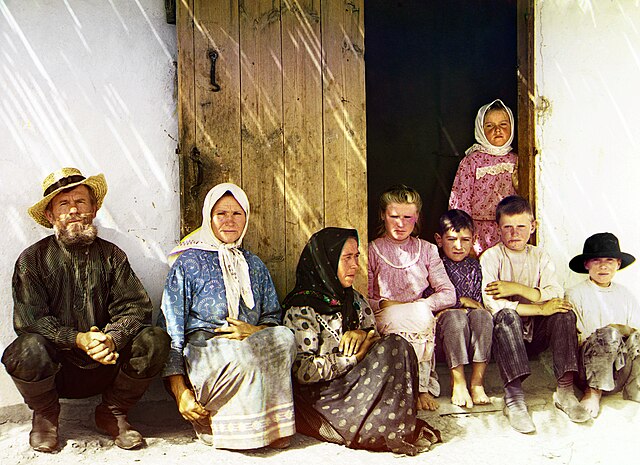Top Qs
Timeline
Chat
Perspective
Settler
Person who has migrated to an area and established permanent residence there From Wikipedia, the free encyclopedia
Remove ads
A settler or colonist is a person who establishes or joins a permanent presence that is separate to existing communities. The entity that settlers establish is a settlement. A settler is called a pioneer if they are among the first settling at a place that is new to the settler community.[1] While settlers can act independently, they may receive support from the government of their country or colonial empire, or from a non-governmental organization, as part of a larger campaign.

The process of settling land can be, and has often been, controversial; while human migration is itself a normal phenomenon, it has not been uncommon throughout human history for settlers to have arrived in already-inhabited lands without the intention of living alongside the native population. In these cases, the conflict that arises between the settlers and the natives, or Indigenous peoples, may result in the dispossession of the latter within the contested territory, usually violently.[2]
The lifestyle of a native population is often disturbed or destroyed if they come into contact with a settler population, particularly when the settler population seeks to mostly replace them.[3] Settlers may also engender a change in culture, or alteration of the existing culture, among the natives.[4] New populations have also been created by the mixing of settlers and natives, including Cape Coloureds in South Africa and Anglo-Indians.[5][6]
Remove ads
Historical usage
Summarize
Perspective

Many times throughout history, settlers occupied land that was previously inhabited by long-established peoples, who are designated as native or Indigenous. The process by which Indigenous territories are settled by foreign peoples is usually called settler colonialism.[7] It relies upon a process of dispossession, often violent.[2]
In the figurative usage, a "person who goes first or does something first" also applies to the American English use of "pioneer" to refer to a settler – a person who has migrated to a less occupied area and established permanent residence there, often to colonize the area, as first recorded in English in 1605.[8] In United States history, it refers to the Europeans who were part of the process of settling lands which here new to them.

The Russian Empire regularly invited Russian subjects and foreign nationals to settle in sparsely populated lands, mostly in North Asia, but also in Central Asia.[9] These projects resulted in the inception of Slavo-Serbia, Volga Germans, Volhynia, and Russians in Kazakhstan, among other phenomena.
Although settlers in the early modern era frequently made use of sea routes—significant waves of settlement could also use long overland routes, such as the Great Trek by the Boer-Afrikaners in South Africa, or the Oregon Trail in the United States.
Anthropological usage
Anthropologists record the tribal displacement of native settlers who drive another tribe from the lands it held, such as the settlement of lands in the area now called Carmel-by-the-Sea, California, where the Ohlone people settled in areas that were previously inhabited by the Esselen people.[10]
Modern usage

In Canada, the term "settler" is used by some to describe "the non-Indigenous peoples living in Canada who form the European-descended sociopolitical majority" and thereby asserting that settler colonialism is an ongoing phenomenon. The usage is controversial.[11][12][13]
In the Middle East and North Africa, there are more recent examples of settler communities being established:
- Iraq – the Ba'athist Arabization campaigns in northern Iraq, which began in 1968, resulted in the ethnic cleansing of non-Arabs, especially Kurds, who were then replaced by Arab settlers in a process that continued until the 2003 invasion of Iraq.[14]
- Israel – large-scale immigration of Jews to Palestine began by 1882—namely to Jerusalem, Hebron, Tiberias, Safed, Jaffa, Haifa, Peki'in, Acre, Nablus, Shfaram, Petah Tikva and various other locations.[15] By 1948, about 630,000 Jewish residents lived there, of which about 460,000 were immigrants.[16] After the 1967 Arab–Israeli War and the Jewish exodus from the Muslim world, Jews from around the world began moving into the formerly restricted and Jordan-occupied West Bank and the formerly Egyptian-occupied Gaza Strip. Since the Israeli Declaration of Independence in 1948, more than 3 million Jews have made aliyah (lit. 'ascent'),[17] the immigration of Jews from the diaspora to the geographical Land of Israel. Israeli settlement has been discussed in the Israeli–Palestinian peace process.[18][19]
- Cyprus – after the Turkish invasion of Cyprus in 1974, citizens of the Republic of Turkey began moving into the internationally unrecognized Turkish Republic of Northern Cyprus. Today, it is estimated that these Turkish settlers constitute around half of the population of Northern Cyprus.[20]
- Morocco – from the beginning of the Western Sahara conflict, citizens of the Kingdom of Morocco began moving into the Moroccan-occupied Western Sahara.[21]
Remove ads
Causes of emigration

The reasons for the emigration of settlers vary, but often they include the following factors and incentives: the desire to start a new and better life in a foreign land, personal financial hardship, social, cultural, ethnic, or religious persecution (e.g., the Pilgrims and Mormons), penal deportation (e.g. of convicted criminals from England to Australia), political oppression, and government incentive policies aimed at encouraging foreign settlement.[22][23][24]
Remove ads
See also
- Anglo-Saxon settlement of Britain
- Chinese settlements in Tibet
- Colonialism
- Forced displacement
- Generalplan Ost
- High Arctic relocation
- Imperialism
- Israeli settlement
- Moroccan settlers
- Naturalized TRNC citizens
- Oregon Trail
- Patriot (American Revolution)
- Phoenix Islands Settlement Scheme
- Pioneer (military)
- Population transfer
- Sooners
- Sri Lankan state sponsored colonisation schemes
- Transmigration program
- Turkic settlement of the Tarim Basin
- Turkish settlers in Northern Cyprus
- Virgin Lands Campaign
References
Wikiwand - on
Seamless Wikipedia browsing. On steroids.
Remove ads
